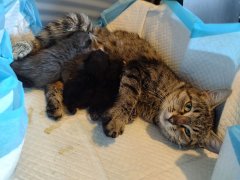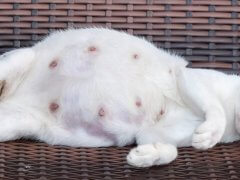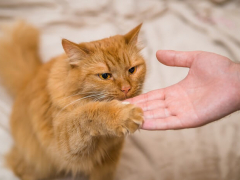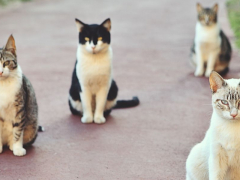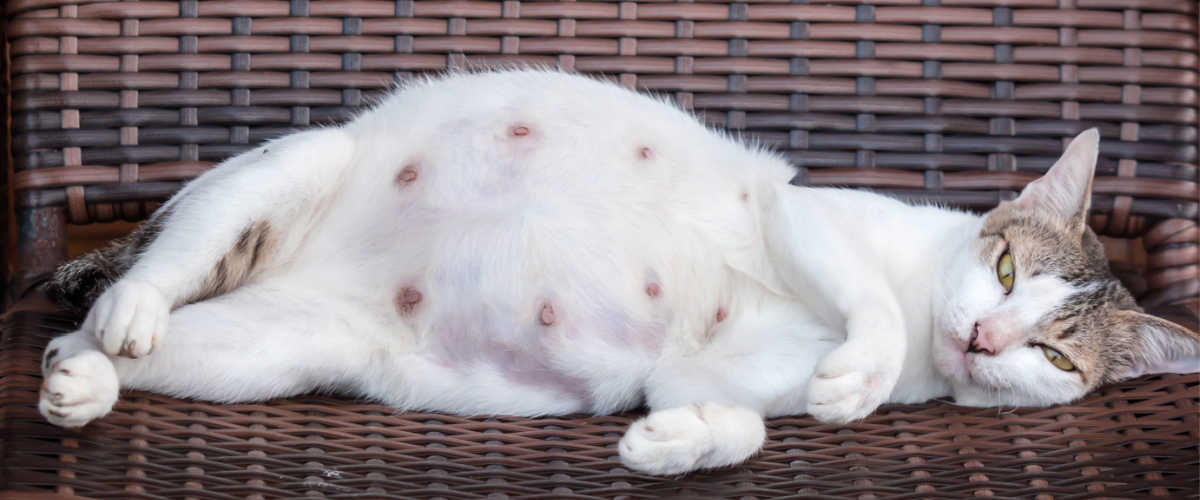
Having kittens is an exciting and anxious time for both you and your cat. Knowing what to expect at each stage of pregnancy helps you ensure your cat’s pregnancy is as happy and relaxed as possible, allows you to provide her with the right care and nutrition, and can help you recognize when something is wrong.
Key Takeaways
The average length of cat pregnancy is 65 days (9 weeks), but cats can give birth anywhere between 61 to 72 days.
Cats need additional fat and calories as their pregnancy progresses.
Cats will seek out a safe and quiet area to give birth, so prepare an area for your cat that you can access easily if required.
The average gestation period for cats is 65 days, although they can give birth anywhere between days 61 and 72. Throughout this time, you’ll notice several behavior changes and physical changes. Let’s take a closer look at what to expect week by week.
Also Read: How To Tell If A Cat Is Pregnant: Labor Signs, Behavior And Timeline
What To Expect During Pregnancy
Throughout your cat’s pregnancy, you will notice different things at each stage. Knowing what to expect makes it easier to notice when something is wrong.
Weeks 1 to 2
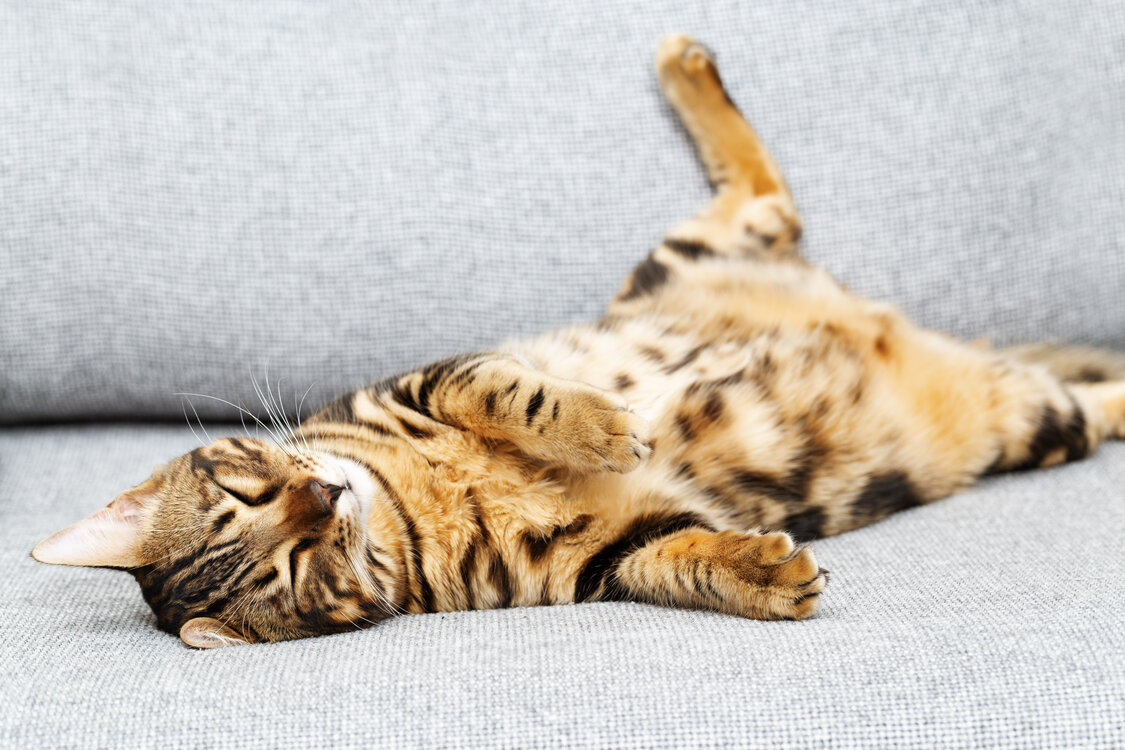
In the first few weeks of pregnancy your cat is likely to look and act the same as she always has.
The first couple of weeks of your cat’s pregnancy is likely to be pretty uneventful. That’s because during this time the fertilized egg is busy implanting in the uterus. It’s not until after this has happened that the body truly recognizes that it’s pregnant. In the first couple of weeks, your cat will most likely behave normally and will continue her heat cycle. It’s important to note that pregnant female cats can mate again and conceive kittens from different male cats.
Also Read: Cat Pregnancy Calculator
Week 3
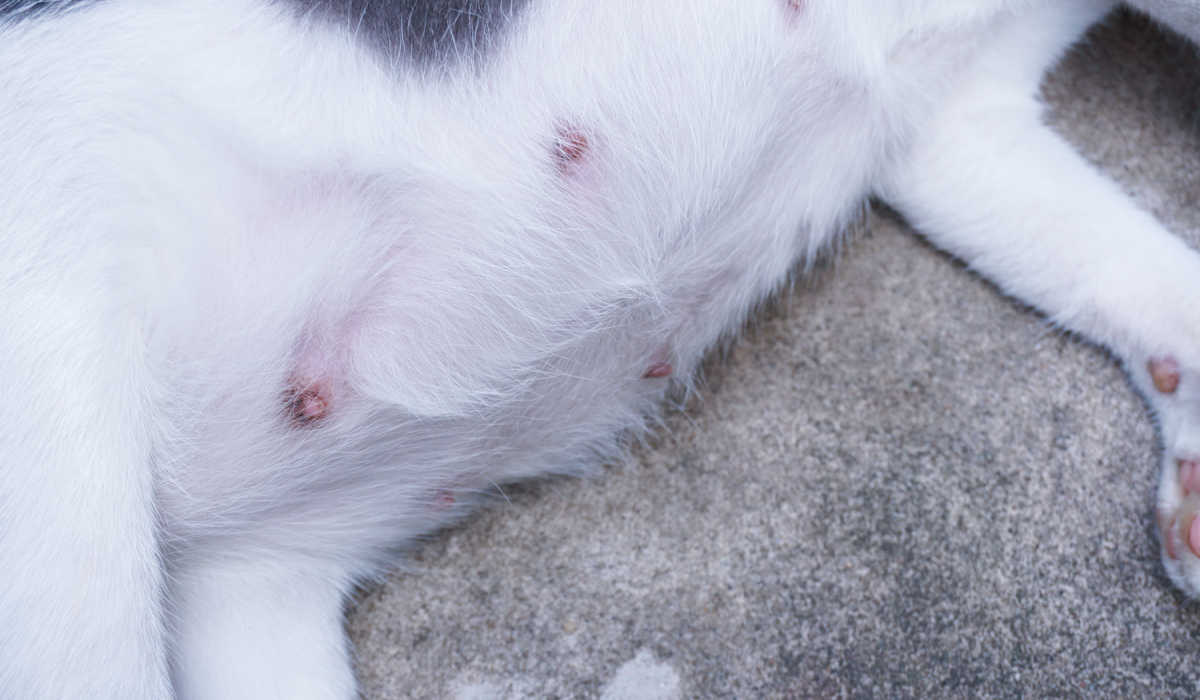
During week 3 of pregnancy, you might notice a little weight gain or see your cat’s nipples becoming more prominent.
Once fertilization has taken place, changes will start to occur as the kittens develop. Your cat’s hormones will change during this time and you’ll start to notice changes in her behavior and her appearance. Her nipples might start to enlarge and get darker, just like in humans, a process called “pinking.” You might also start to notice her gaining a little weight.
Also Read: Cat Weight Calculator
Week 4
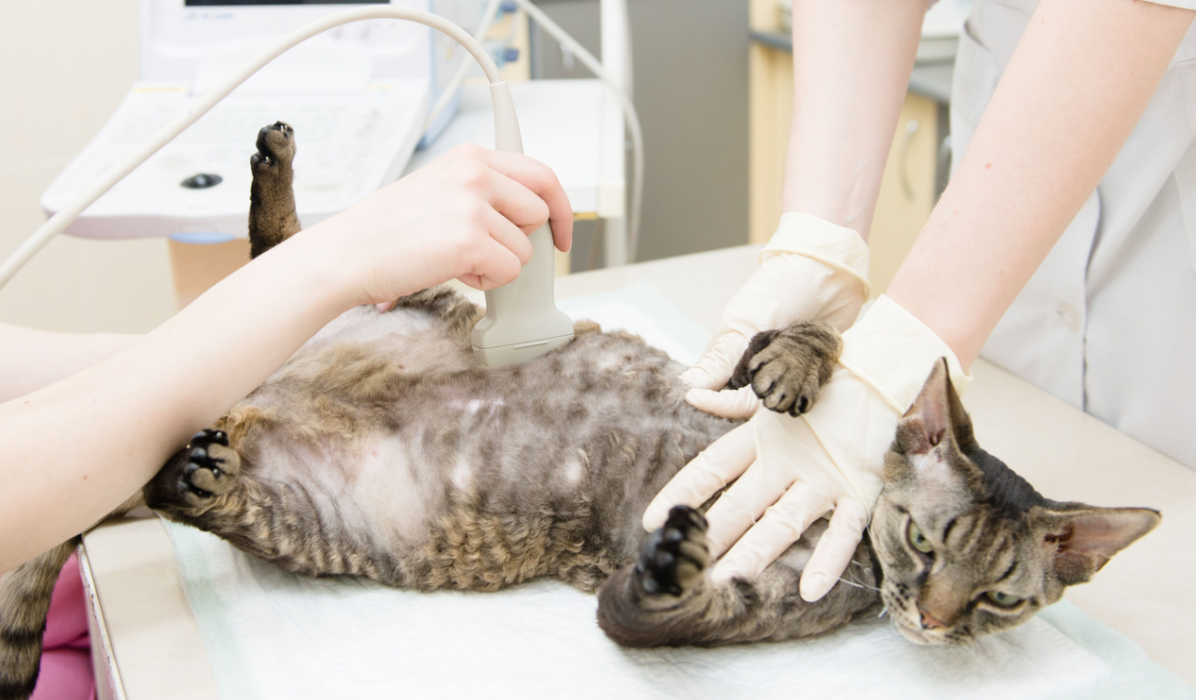
During week 4, a veterinarian can ultrasound your cat to confirm the pregnancy.
Believe it or not, cats can suffer from morning sickness, just like us humans. It’s common for pregnant cats to start vomiting or going off their food at around week 4, and this can happen at any time of day, not just in the morning.
If the vomiting is excessive or your cat is not eating at all, this might be a cause for concern so it’s important to discuss this with your vet. You’ll also see some noticeable weight gain at this time.
At this stage of pregnancy, your vet will be able to use an ultrasound to confirm the pregnancy by looking for the fetuses on the scan. They might be able to feel the pregnancy by palpation, but this is not accurate, and you should never try to do this yourself at home.
Also Read: How Many Kittens Can A Cat Have?
Week 5
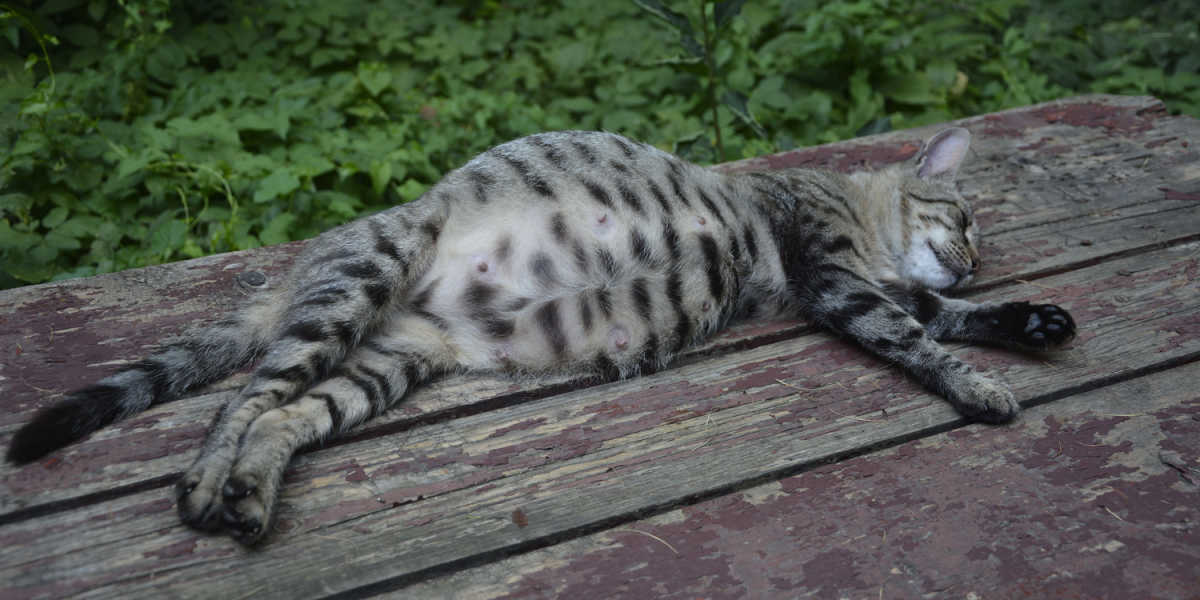
As your cat’s pregnancy progresses, her belly will visibly swell, an obvious sign the kittens inside her are growing.
The kittens will be growing well at this point, and your cat will start to look very pregnant. An ultrasound scan at the vet might be able to tell you the number of kittens you can expect. They can also use an x-ray (from day 42 onward) to look at how many kittens to expect.
Week 6
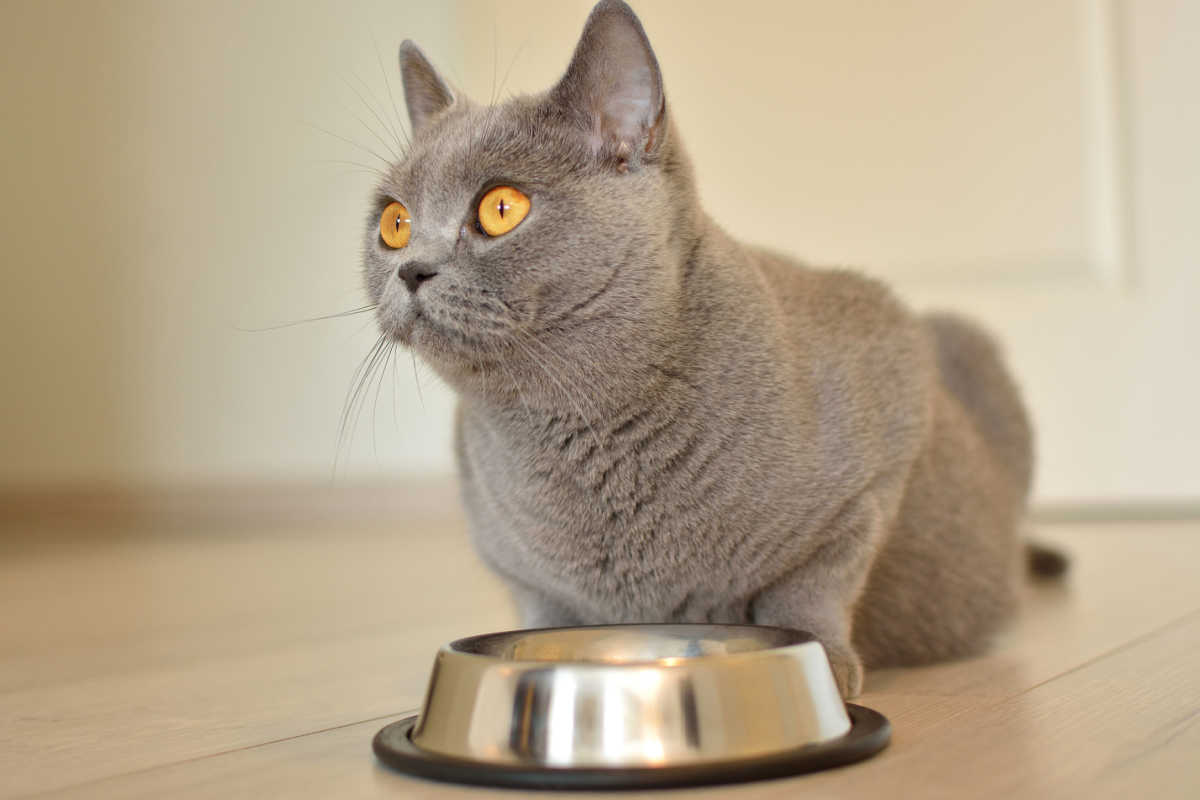
Talk to your vet about how much to feed your pregnant cat, and whether she should eat a different food during pregnancy and nursing.
This is the stage of pregnancy where your cat will start to have a noticeably increased appetite as she needs enough energy and nutrients for herself as well as her kittens. You’ll notice her wanting more food, and you’ll need to discuss a suitable nutritional plan with your vet to ensure she’s getting everything she needs.
Week 7
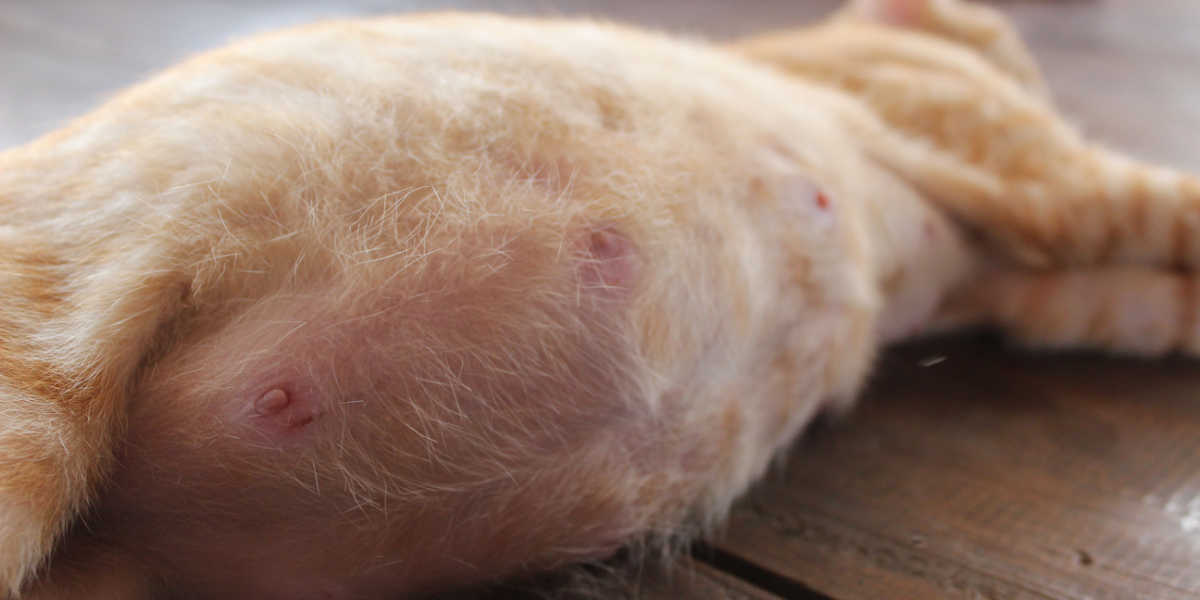
As your pregnant cat begins the nesting phase, she might start looking for a cozy and safe place to give birth.
Now your cat is 2 weeks away from kittening, she will be starting to think about the big day. You might start to notice nesting behavior such as seeking out a safe and quiet place to give birth.
Your cat will check out under the behind, laundry bins, and areas behind furniture where she feels safe and secure, and won’t be disturbed. This is when you should introduce her to a pre-prepared kittening area.
You might also notice other behavioral changes such as purring more often or clinginess.
Week 8
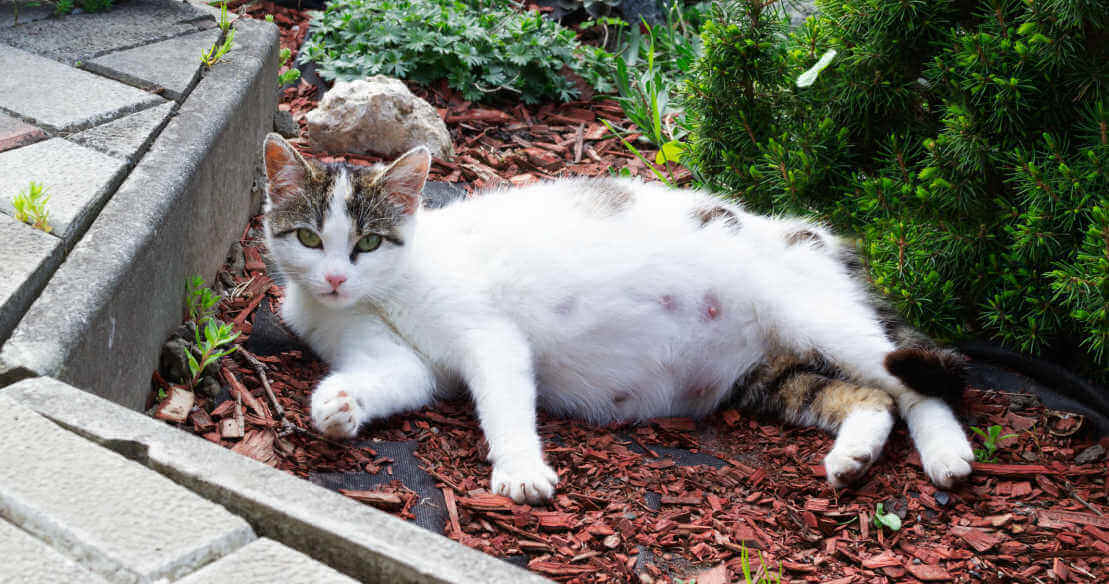
By week 8, a pregnant cat’s nipples will become even larger and she might lose some of the hair on her belly.
As your cat nears her due date, her body will start preparing itself. You’ll notice her nipples becoming more swollen, and she might be grooming herself more than normal, and even losing some of the fur from her belly.
Week 9
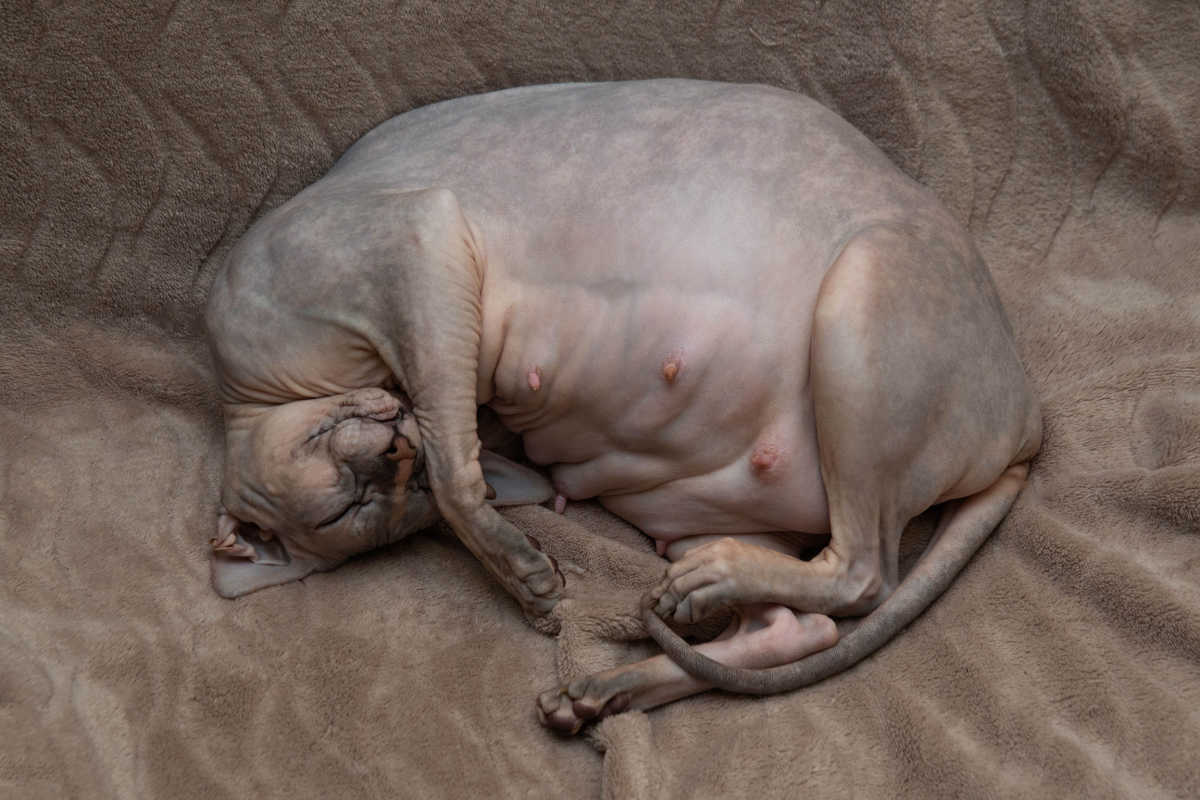
Although the average feline gestation period is 65 days, your cat might have her kittens anywhere between days 61 and 72.
This is the week that your cat will reach her due date. In the days leading up to it, you’ll start to notice her pacing and looking for reassurance and fuss from you. You might also start to see a red vaginal discharge from her vulva—this is normal and a sign that she’s very close to kittening.
If you notice any large volumes of discharge, or anything green or unusual, get her checked by a veterinarian. In the 24 hours before giving birth, a pregnant cat’s body temperature will also go down slightly. Sometimes, cats go a bit over their due date, and this can be fine, but if it starts to go into a 10th week, get some advice from your usual vet.
Also Read: Cat Giving Birth: What You Need To Know?
Cat Behavior During Pregnancy
Your cat’s hormones will change while she is pregnant, and this can affect her behavior. Some cats don’t show much of a change; others can have some quite dramatic changes in their behavior.
Some common behaviors and signs of pregnancy include:
- Wanting more attention or being clingy
- Looking for you more often
- Pacing
- Purring more frequently
- Decreased appetite
- Seeking out places to give birth (toward the end of pregnancy)
Also Read: Fostering A Pregnant Cat: What You Need To Know?
Feeding Your Pregnant Cat
As soon as you know that your cat is, or might be, pregnant, it’s important to ensure she’s on the right diet. She is going to need the right nutrition to make she can carry and develop healthy kittens as well as stay healthy and strong herself. High-fat cat food is suitable during early pregnancy. Always introduce the new food gradually by mixing it in with her usual food over several days to avoid any tummy upset.
The energy requirements of a pregnant queen increase by 10% every week, so by the last stage of pregnancy, she’ll be eating a massive 70% more than normal! Your vet will be able to advise you on which food is most suitable for your cat and help you devise a feeding plan that you can work through to increase her food intake each week.
On the flip side, too much weight gain is not a good thing. You should weigh your cat regularly throughout her pregnancy to ensure she doesn’t gain too much.
Also Read: How To Make A Cat Feel Safe In 10 Simple Steps
Preparing For The Big Day
Hopefully, you will know when your cat’s due date is, which will help you to prepare for the big exciting day. Your cat is going to need somewhere clean and safe to give birth, and in the two weeks leading up to giving birth she will start to search for a suitable spot. You’ll need to prepare an area for her, to ensure she has everything she needs and that you have easy access to her and the kittens.
Here are our top tips for setting up the perfect kittening area:
- Choose a quiet place where other people and pets are not passing through frequently
- Choose somewhere warm with no draughts
- A semi-enclosed area will help her feel safe and secure while allowing you access (e.g., a cardboard box with the top cut off or a hole in the side)
- Provide plenty of clean and comfortable blankets and bedding
- Avoid any harsh or bright lighting as this could disturb her
- Choose somewhere close to food, water, and the litter box
Let your cat explore this place and sniff it out for herself so that hopefully she will recognize this as a suitable birthing spot. However, there is still a chance that your cat will have a mind of her own, and when it comes to it she might choose another location in your home!
Also Read: How To Take Care Of A Kitten: The Complete Guide
Week by week your cat’s behavior, appetite, and appearance will change as her pregnancy progresses, as her hormones change and the kittens grow. In the first couple of weeks, you probably won’t notice much, but after that, you’ll start to notice behaviors that indicate pregnancy, and as the weeks go by she’ll start to gain weight and eat more.
Toward the end of pregnancy, you can expect to see some nesting behavior as your cat looks for the right spot to give birth—this is when you’ll need to start preparing a nesting box to place in a safe and quiet place in your home, ready for the big day!
Also Read: The Complete Guide to Bottle Feeding Kittens
Frequently Asked Questions
How long are cats pregnant?
Cats are usually pregnant for 65 days. But they can give birth anywhere between 61 to 72 days.
How much should I feed my pregnant cat?
Your cat’s energy requirements will increase by 10% every week. By the last stage of pregnancy, she’ll need to eat a lot more than normal. From week 6, you’ll need to increase her food intake, under the guidance of your vet.
Will my cat’s behavior change when she’s pregnant?
A cat’s behavior usually changes while she is pregnant, as her hormones change and she prepares to give birth. Many cats become clingy and needy, purr more, and sometimes have some vomiting. In the later stages, they start to show nesting behaviors.
-
https://www.purina.co.uk/articles/cats/health/pregnancy/spotting-the-signs-of-cat-pregnancy
-
https://www.royalcanin.com/uk/cats/kitten/looking-after-and-feeding-your-pregnant-cat
-
https://www.cats.org.uk/media/1029/eg18_pregnant_cats-_birth_and_care_of_young_kittens.pdf
